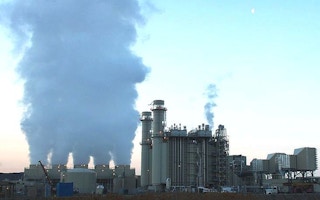Malaysia announced its phase-out plan for the country’s existing coal-fired power plants at a high-level dialogue in London on Tuesday, with the country’s deputy prime minister pledging that the size of the fleet will be halved by 2035, and completely retired by 2044.
To continue reading, subscribe to Eco‑Business.
There's something for everyone. We offer a range of subscription plans.
- Access our stories and receive our Insights Weekly newsletter with the free EB Member plan.
- Unlock unlimited access to our content and archive with EB Circle.
- Publish your content with EB Premium.
Fadillah Yusof, who is also the energy transition and water transformation (PETRA) minister, made the announcement at a dialogue on global coal phase out at London Climate Action Week. The event was organised by Powering Past Coal Alliance, an alliance co-chaired by United Kingdom and Canada, and Bloomberg Philanthropies.
Previously, Malaysia’s National Energy Transition Roadmap (NETR) had projected that coal contribution to Malaysia’s power supply will be almost completely phased out by 2045, driven by natural retirement of coal plants.
Fadillah reiterated Malaysia’s commitment to achieving net zero emissions by 2050, while highlighting that Malaysia only contributes 0.8 per cent of global emissions.
“In recognising the pivotal role of our collective efforts in mitigating climate change, we are now consciously transitioning away from coal-fired power generation,” the deputy prime minister said. Coal-fired generation currently accounts for nearly half of Malaysia’s national emissions.
Fadillah added that the shift would be balanced and equitable, and Malaysia will commit to minimising economic disruption and maintaining a stable energy supply.

Malaysian deputy prime minister Fadillah Yusof, who heads the energy transition and water transformation ministry (PETRA), speaking at the global coal phase-out dialogue at Battersea Power Station during London Climate Action Week. Image: Ministry of Energy Transition and Water Transformation
He also acknowledged the coal fleet’s retirement would cause significant social and economic challenges such as job losses and concerns over stranded assets, and said the government is quickly developing reskilling programmes for workers.
As of 2020, Malaysia’s NETR noted that coal comprised 26.4 per cent of Malaysia’s energy mix, while renewables only made up 3.9 per cent.
Fadillah added that Malaysia was taking decisive steps through the NETR to increase the national renewables output to 70 per cent of installed capacity by 2050.
“While phasing out coal is critical, it is only one facet of the broader challenge and it is essential for us to acknowledge the costs associated with fully replacing its baseload capacity,” he said, adding Malaysia was actively promoting the development and deployment of renewables from solar, to biomass and waste-to-energy.








